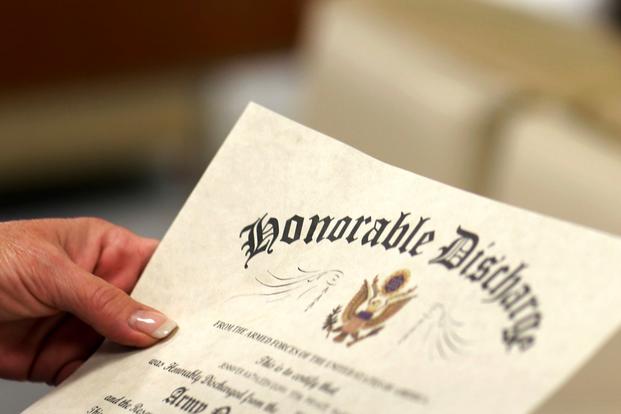What Is Military Discharge?
A military discharge is when a service member is released from their military service obligations. More than 200,000 U.S. service members leave the military each year.
Is Military Discharge the Same as Separation?
"Separation" from the military is a broad term that includes "discharge, release from active duty, release from custody and control of the military services, transfer to the Individual Ready Reserve, and similar changes in active or reserve status," according to the U.S. Department of Labor's Veterans' Employment and Training Service.
Separation can be voluntary or involuntary, and it can include disciplinary or punitive reasons.
Types of Military Discharge
When someone gets out of the military, they receive a separation document that certifies their military service and also indicates whether their service to the nation was completed satisfactorily. This document, the DD-214, usually lists the dates of service, any commendations or medals received, the reason for separation and the military's characterization of their service.
This characterization of one's military service is also known as the type of military discharge. It can be very important later in life to anyone wishing to receive federal or state veterans benefits or special considerations because of their military service. Most medical or disability discharges are characterized as honorable.
For most people, anything other than an honorable or general discharge is considered a "bad paper discharge," because that one piece of paper (the DD-214) can spell bad news for their future.
There are several main types of military discharges or separation characterizations:
Honorable Discharge
If you complete your military service or you're discharged early through no fault of your own, your characterization probably will be honorable. This is the type of discharge a person receives if they complete their contracted obligation with proper military behavior and proficient performance of duty. This includes not running afoul of the Uniform Code of Military Justice (UCMJ). This type of characterization usually doesn't affect future civilian employment negatively and entitles you to veteran benefit, if you otherwise qualify.
Read More: Honorable Discharge: Everything You Need to Know
General Discharge
A general discharge means most of your service was OK, but some problems occurred. This is issued when a person shows a pattern of minor misconduct or fails to complete the original service contract. Oftentimes, the misconduct isn't serious enough to be a criminal offense in the civilian world, but it disrupts military discipline and order. This may also be given if the service member leaves the military for things such as physical readiness failure or parenthood. Usually, you're still entitled to many veteran benefits, but some employers may question you about why you "got fired" from the military.
Other Than Honorable (OTH) Discharge
Also known as a "bad paper discharge," an OTH discharge means you got "fired" from the military for doing something very bad and were probably lucky to escape a court-martial. An OTH is given when there is misconduct that could be considered a misdemeanor in the civilian world. These could include incidents such as drug use, fighting, abuse of position or disobeying an order. Veteran benefits usually are not authorized, and you may find it hard to get a good civilian job.
Read More: Other Than Honorable Discharge: Everything You Need to Know
Bad Conduct Discharge (BCD)
This is a punitive discharge that can be imposed as a punishment by a military court-martial for serious offenses, following a finding of guilty for a military offense. It may also be given if someone exhibits a pattern of convictions for misconduct that indicates they are unfit to serve in the military. Individuals with a bad conduct discharge are not eligible for most veteran benefits, and many employers aren't likely to consider these applicants.
Dishonorable Discharge
Given as a punishment for a serious offense. Usually when someone commits a felony-level offense, either in the military or civilian jurisdiction.
Read More: Dishonorable Discharge: Everything You Need to Know
Bad conduct discharges (BCD) and dishonorable discharges are considered punitive discharges, which means they are a legal punishment. As such, they may only be handed down by a court-martial. The law that governs veterans benefits specifically says anyone with an other-than-honorable discharge or worse is not legally considered a veteran by the federal government. Since they aren't considered veterans, they aren't eligible for any veterans benefits. This applies to all federal and many state benefits.
Related: What is a Military Court-Martial?
Officer Discharge
A commissioned officer cannot receive a bad conduct discharge or a dishonorable discharge. For them, the equivalent of a dishonorable discharge is an officer's discharge.
Medical Discharge
A medical discharge is not considered punitive and, in terms of veterans benefits, is typically seen in the same category as an honorable discharge.
Read More: VA Benefits for Service Members Considered for Medical Discharge (VA Fact Sheet)
Entry-Level Separation (ELS)
If a service member leaves within the first 180 days of service for reasons including medical issues, they are given an entry-level separation. Though not considered a stain on their record, an ELS discharge typically prevents them from being considered veterans and therefore prevents them from receiving veterans benefits.
Can You Upgrade Your Discharge Type?
Each branch has a discharge review board with the authority to change, correct or modify discharges. The board has no authority to address medical discharges or those issued by a general court-martial.
How to Apply for a Discharge Upgrade
Are you a veteran who needs to change, correct or modify your discharge? If you qualify and take the proper steps, you can apply for a review of discharge and possibly have it changed.
When the VA determines eligibility for benefits, it looks at a veteran's entire military service. If the veteran reenlisted at least one time in their military career, they may be eligible for benefits, no matter what type of discharge they received when they finally left the service.
The VA will review the service record and see whether the veteran ever reenlisted. If so, that means the veteran was honorably discharged from the service in order to reenlist, and they will most likely be eligible for all normal veterans benefits.
Read More: How To Upgrade Your Military Discharge
Know All Your Legal Rights and Benefits
Be aware and get what you are entitled to. Keep up with all the legal benefits available to you as a service member, veteran or spouse and get updates delivered straight to your inbox by subscribing to Military.com.
Parts of this report were compiled from Information from Basic Training for Dummies, copyright © 2011 by Wiley Publishing, Inc., Hoboken, New Jersey. Used by arrangement with John Wiley & Sons, Inc.












